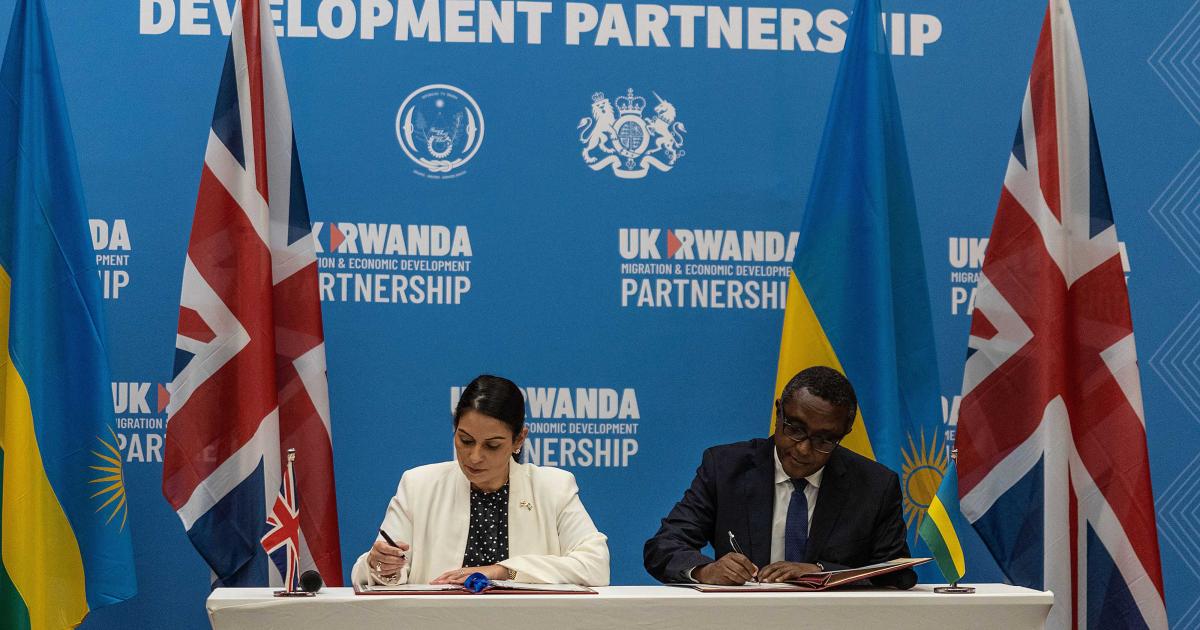UK Set To Send Asylum-Seekers To Rwanda Under New Plan

British Prime Minister Boris Johnson defended his plan to send asylum-seekers of various nationalities to Rwanda just hours before the first plane was set to leave Tuesday, saying that efforts to block the flights were “abetting the work of criminal gangs” involved in smuggling people across borders.
Johnson’s government has reached an agreement with Rwanda to deport people who enter the U.K. illegally to the East African country in exchange for millions of pounds (dollars) in development aid. The government contends this will deter people from paying criminals to help them take the risky journey across the English Channel in small boats.
The policy has faced a series of legal challenges and sparked heated protest in the U.K. While the government has defended its choice of Rwanda by citing its stability and economic progress since the 1994 genocide, critics have said that stability comes at the cost of political repression. Tensions between Rwanda and Congo also took a worrying turn Monday, when Congo’s military accused its neighbour of backing rebels who seized a Congolese town.
The challenges to deportation continue, albeit on narrow legal issues. The U.K. The Supreme Court refused to hear one last-ditch appeal Tuesday after lower courts refused to block the deportations. The first flight is expected later in the day, though perhaps with only a handful of people aboard.
The prime minister insisted the government would not be cowed by those attacking the strategy and told Cabinet ministers that “we are going to get on and deliver” the plan.
“I think that what the criminal gangs are doing, and what those who effectively are abetting the work of the criminal gangs are doing, is undermining people’s confidence in the safe and legal system, undermining people’s general acceptance of immigration,” Johnson said.
Thousands of people a year — many fleeing conflict, repressive governments or grinding poverty — try to cross the English Channel in dinghies and other fragile craft in hopes of starting a new life in the U.K. More than 28,000 people — the majority from Iran, Iraq and Eritrea — entered Britain that way last year, up dramatically from 8,500 in 2020. Dozens have died.
Migrants have long used northern France as a launchpad to reach Britain, a destination favored by many for reasons of language or family ties, or because of the country’s perceived open economy. The British and French governments have worked to stop the journeys, with a great deal of bickering and not much success, and the U.K.’s exit from the European Union in 2020 strained their relationship and made cooperation even more difficult.
As the first flight draws closer, opposition to the plan has come from more quarters, including from the leadership of the Church of England and, newspaper reports say, Prince Charles. The heir to the throne privately described the Rwanda policy as “appalling,” the Times reported over the weekend, citing an unidentified source.
Filippo Grandi, the U.N. high commissioner for refugees, has also lashed out at the policy, describing it as “all wrong.” If the British government is truly interested in protecting lives, it should work with other countries to target the people smugglers and provide safe routes for asylum seekers, not simply shunt migrants to other countries, Grandi said.
While a major precedent is at stake, the number of people immediately affected by the cases has been steadily whittled down as lawyers challenge the merits of each deportation order. British media reported that the number of migrants scheduled to be on a Tuesday night flight is now seven, down from 31 migrants told last week they would be leaving.
Foreign Secretary Liz Truss earlier said that the first deportation flight to Rwanda would take off Tuesday, regardless of how many people were on board.
“I can’t say how many people will be on the flight, but the really important thing is that we establish the principle and we start to break the business model of these appalling people traffickers who are trading in misery,” Truss told Sky News.
The comments came as 25 Church of England bishops, including Archbishop of Canterbury Justin Welby, wrote an open letter describing the deportation plans as an “immoral policy that shames Britain.”
“The shame is our own, because our Christian heritage should inspire us to treat asylum-seekers with compassion, fairness and justice, as we have for centuries,” the bishops wrote in the letter to the Times of London.
Source: AP








